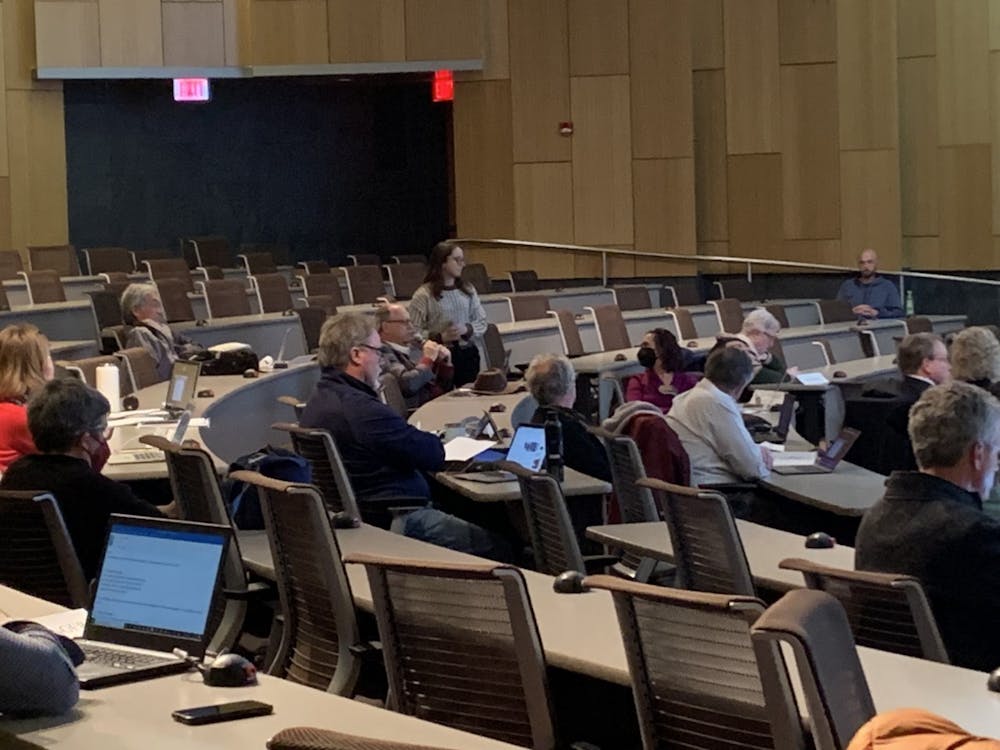Academic Senate discusses scantrons, AI technology at Tuesday meeting
Questions of the future of Central Michigan University's relationship with new technology like AI, and the replacement of previously relied-upon methods like the Scantron system in favor of online alternatives were topics of discussion at CMU's most recent academic senate meeting.
The second meeting of the semester began with a presentation from Provost Nancy Mathews, including a commendation of the university’s faculty, who earned a total of 24 grants and awards this month.
Scantron Use
In a question submitted to the provost in preparation for the meeting, one senator expressed concerns from faculty with the phasing out of Scantron systems for exams in favor of digital methods.
The question was of the relative cost to continue Scantron services. Mathews gave an estimate of around $10,000 to $11,000 a year, which she later clarified would be the cost of continued maintenance and upkeep without updates.
If the usage of Scantron were discontinued, she said, that money would go towards more digital alternatives, namely Blackboard Learn Ultra, a premium service of the Blackboard learning management system which professors are “encouraged to use,” according to CMU’s informational page for new faculty.
While some professors find that the “jury’s still out,” Mathews said, on the potential of Blackboard to be a better alternative, she said that with the ever-evolving state of technology, online alternatives such as Blackboard pose viable options. Should it fail to meet the needs of professors, other options will be considered.
However, such a switch from the Scantron system to Blackboard Ultra does pose accessibility issues, noted Tyler Zimmerman, a member of the academic senate and president of the Student Government Association.
“I encourage the University to ensure that resources and accommodations are available to students who may not have access to high-speed laptops or other electronic devices as well as those who have sensitivity to screens to ensure that they can still be academically successful both in and outside of the classroom.” Zimmerman said in a statement to CM Life.
Drops in Enrollment and Employment
The next question was on the subject of the decline in student enrollment, which reached a 43.5% decrease since its peak in 2015, and how staff employment was fairing in comparison.
Mathews said that in almost the same time period, there has been a 23% decrease in non-instructional and a 24.1% decrease in instructional staff.
Of the instructional staff, there has been a 24% drop in fixed-term employed faculty and a 25% drop in those with a tenure track.
"We're working hard to regain lost ground from the past few years," Mathews said.
Artificial intelligence
Finally, the question of artificial intelligence was raised, the focus being whether the university would be making changes to utilize the use of programs such as ChatGPT in classrooms.
Mathews answered that efforts have already begun to utilize AI, with $55,000 in efforts already having been invested so far. While she stated that it is too early to anticipate how AI will be put to use, she remarks that it is here to stay, and “will be part of students’ futures.”
When the concern of AI being used as a tool for academic dishonesty was presented, Mathews went on to state that such existing issues were “not reaching her,” and expressed a belief that CMU’s strong policies and focus on academic integrity deter any potential cheaters.
She said that there has not been a software able to detect AI-written work with full accuracy as of now.
Academic Senate meetings are held from 3:30 to 5 p.m. bi-weekly on Tuesdays in the French Auditorium. Meeting livestreams and recordings are on the senate website.







